Why Did Huawei Remove the HCIE Interview?
Update time:2025-09-11
Many candidates preparing for the Huawei HCIE certification often ask:
“Why did Huawei cancel the interview stage?Without an interview, will the certification lose its value?”
As someone deeply involved in ICT certifications, I’ll break this down from four perspectives: efficiency improvements, exam focus shift, global expansion, and certification credibility.

1.Efficiency Revolution: Lowering Costs, Accelerating the Process
In May 2021, Huawei officially announced that the HCIE interview was removed, simplifying the process from Written + Lab + Interview to just Written + Lab.
For candidates:
Previously, after passing written and lab, candidates still needed 1–2 months to prepare for the interview (memorizing project cases, simulating Q&A).
This was especially challenging for technical professionals less confident in public speaking.
With the interview removed, prep time is cut by 20%–30%, letting candidates focus on technical skills.
For Huawei:
The interview had high operating costs, requiring senior experts as assessors.
Standardizing assessors worldwide (technical + language) was difficult.
With HCIE certifications expanding globally (4,800+ new HCIEs since 2023), a standardized lab exam scales far better than human-led interviews.
This mirrors Cisco’s CCIE — no interview, only lab exams — yet the certification is still globally respected.
2.Shift in Focus: From “Oral Expression” to “Hands-On Skills”
Removing the interview does not lower the bar — instead, the exam now emphasizes real-world technical ability.
Huawei upgraded the lab exam to cover what the interview used to test:
Technical depth: Comprehensive design tasks, requiring candidates to plan a large-scale network in 8 hours.
Troubleshooting: New fault injection modules (e.g., misconfigured IPs, mid-exam configuration changes) — worth 20% of the score.
Solution explanation: Written documentation of design logic and troubleshooting steps, testing both understanding and clarity of thought.
This adjustment better reflects enterprise needs — dynamic troubleshooting in labs is far more realistic than answering interview questions like “How would you solve a network outage?”
For candidates, this means preparation should focus more on practice exams from dumps , not memorizing interview answers.
3.Global Strategy: Removing Language Barriers
Another reason for the change is internationalization.
The old interview was only in Chinese or English, disadvantaging non-native speakers.
European candidates often lost points due to English fluency, and Southeast Asian candidates due to accents.
These language issues limited HCIE’s global adoption.
Now:
All candidates compete in a standardized lab environment.
Results are purely technical, more objective and fair.
Post-change, global HCIE numbers grew sharply (hundreds added in Europe alone).
This aligns with Huawei’s global strategy — as technologies like openEuler and HarmonyOS go abroad, HCIE is positioned as a “technical passport” recognized internationally.
4.Certification Value: Stronger, Not Weaker
Some worry removing the interview “waters down” HCIE.In fact, the opposite is true.Huawei strengthened standards by:
More complex labs: Still 8 hours, but tasks are now more challenging, with dynamic fault scenarios.
Faster content updates: From Q4 2025, new troubleshooting modules will be added to Datacom HCIE.
Stricter grading: Every step in the lab is system-recorded, eliminating subjective bias.
Feedback from employers shows:
Post-change HCIE holders are more job-ready.
Previously, some candidates memorized interview Q&A but lacked hands-on skills.
Now, passing requires real technical competence.
Conclusion
Huawei’s decision to cancel the HCIE interview reflects a shift from comprehensive evaluation to practical, skills-based testing.
In an industry where technology evolves rapidly, companies value engineers who can solve real problems, not just speak well in interviews.
The lab exam’s new troubleshooting and design modules capture the same depth as interviews, but in a fairer, more technical way.
For candidates, the focus is no longer “how to explain technology”, but “how to do technology right”.
In ICT, true skills will always outweigh presentation.
And the best way to prepare now is through HCIE dumps and hands-on practice — ensuring you’re not only certified, but capable.
“Why did Huawei cancel the interview stage?Without an interview, will the certification lose its value?”
As someone deeply involved in ICT certifications, I’ll break this down from four perspectives: efficiency improvements, exam focus shift, global expansion, and certification credibility.

1.Efficiency Revolution: Lowering Costs, Accelerating the Process
In May 2021, Huawei officially announced that the HCIE interview was removed, simplifying the process from Written + Lab + Interview to just Written + Lab.
For candidates:
Previously, after passing written and lab, candidates still needed 1–2 months to prepare for the interview (memorizing project cases, simulating Q&A).
This was especially challenging for technical professionals less confident in public speaking.
With the interview removed, prep time is cut by 20%–30%, letting candidates focus on technical skills.
For Huawei:
The interview had high operating costs, requiring senior experts as assessors.
Standardizing assessors worldwide (technical + language) was difficult.
With HCIE certifications expanding globally (4,800+ new HCIEs since 2023), a standardized lab exam scales far better than human-led interviews.
This mirrors Cisco’s CCIE — no interview, only lab exams — yet the certification is still globally respected.
2.Shift in Focus: From “Oral Expression” to “Hands-On Skills”
Removing the interview does not lower the bar — instead, the exam now emphasizes real-world technical ability.
Huawei upgraded the lab exam to cover what the interview used to test:
Technical depth: Comprehensive design tasks, requiring candidates to plan a large-scale network in 8 hours.
Troubleshooting: New fault injection modules (e.g., misconfigured IPs, mid-exam configuration changes) — worth 20% of the score.
Solution explanation: Written documentation of design logic and troubleshooting steps, testing both understanding and clarity of thought.
This adjustment better reflects enterprise needs — dynamic troubleshooting in labs is far more realistic than answering interview questions like “How would you solve a network outage?”
For candidates, this means preparation should focus more on practice exams from dumps , not memorizing interview answers.
3.Global Strategy: Removing Language Barriers
Another reason for the change is internationalization.
The old interview was only in Chinese or English, disadvantaging non-native speakers.
European candidates often lost points due to English fluency, and Southeast Asian candidates due to accents.
These language issues limited HCIE’s global adoption.
Now:
All candidates compete in a standardized lab environment.
Results are purely technical, more objective and fair.
Post-change, global HCIE numbers grew sharply (hundreds added in Europe alone).
This aligns with Huawei’s global strategy — as technologies like openEuler and HarmonyOS go abroad, HCIE is positioned as a “technical passport” recognized internationally.
4.Certification Value: Stronger, Not Weaker
Some worry removing the interview “waters down” HCIE.In fact, the opposite is true.Huawei strengthened standards by:
More complex labs: Still 8 hours, but tasks are now more challenging, with dynamic fault scenarios.
Faster content updates: From Q4 2025, new troubleshooting modules will be added to Datacom HCIE.
Stricter grading: Every step in the lab is system-recorded, eliminating subjective bias.
Feedback from employers shows:
Post-change HCIE holders are more job-ready.
Previously, some candidates memorized interview Q&A but lacked hands-on skills.
Now, passing requires real technical competence.
Conclusion
Huawei’s decision to cancel the HCIE interview reflects a shift from comprehensive evaluation to practical, skills-based testing.
In an industry where technology evolves rapidly, companies value engineers who can solve real problems, not just speak well in interviews.
The lab exam’s new troubleshooting and design modules capture the same depth as interviews, but in a fairer, more technical way.
For candidates, the focus is no longer “how to explain technology”, but “how to do technology right”.
In ICT, true skills will always outweigh presentation.
And the best way to prepare now is through HCIE dumps and hands-on practice — ensuring you’re not only certified, but capable.
I'm your man who have the 100% valid dumps , buy it now for 50% off to clear your exam!
Click it ↓↓
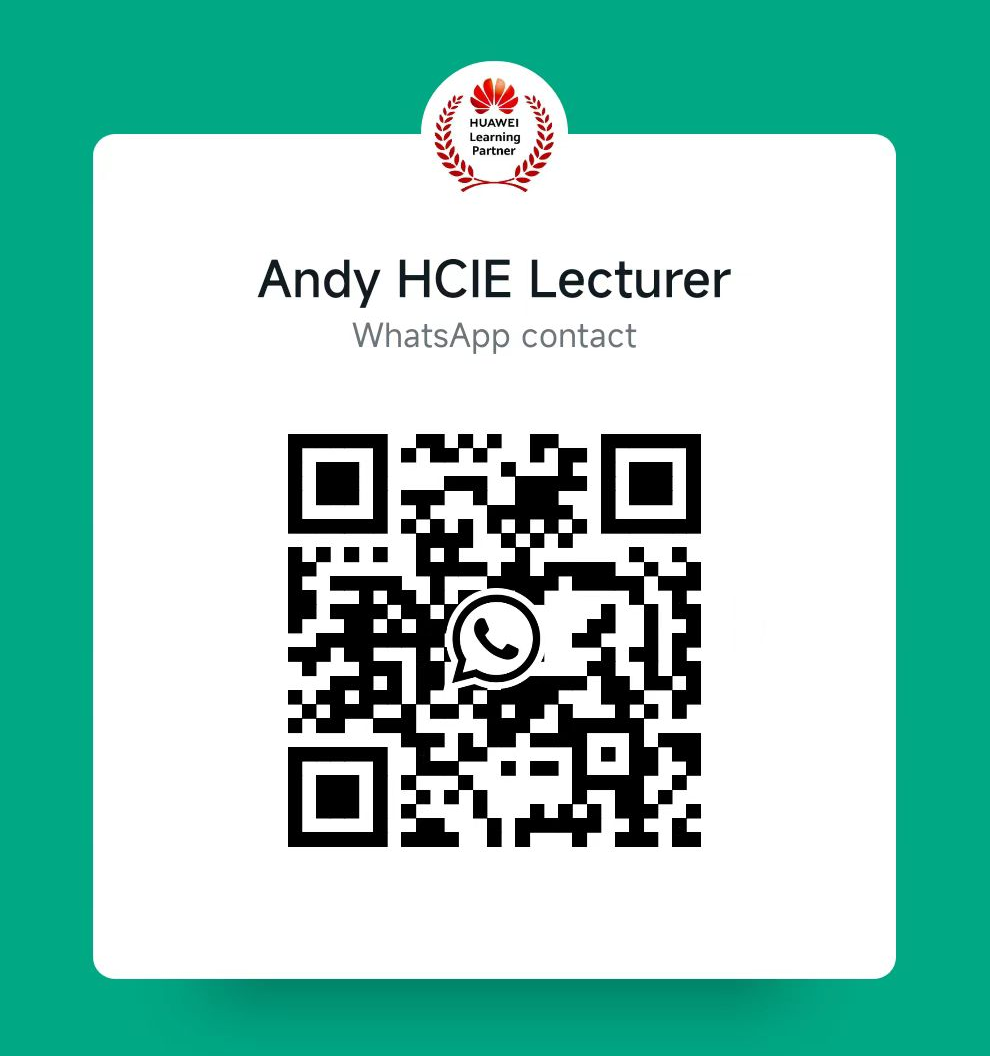
Hot article
-
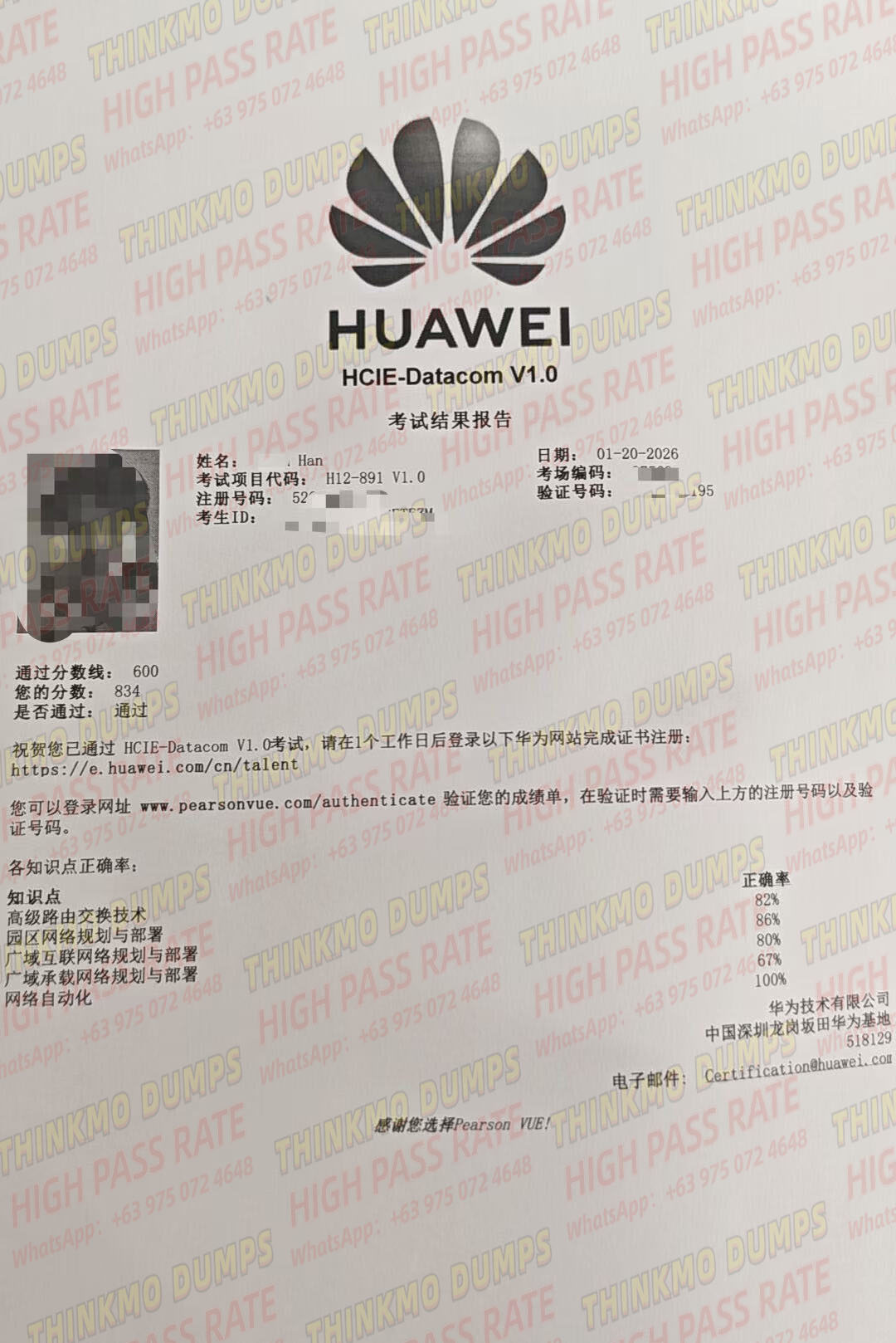 1
1 1. ThinkMo Precise Question Bank: Ace HCIE Written
上传:2026-01-23
-
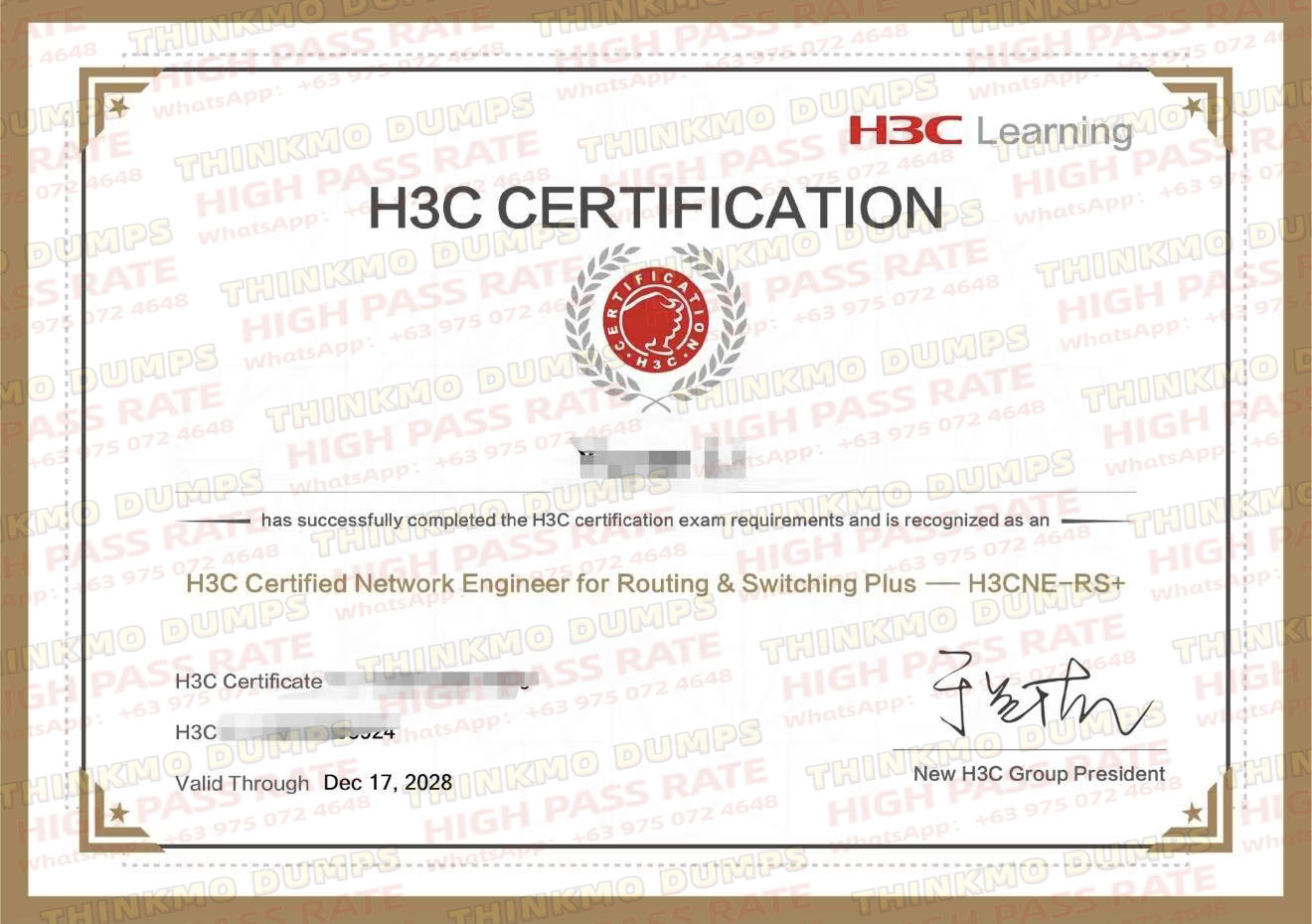 2
2 Triple H3CNE/H3CSE Passes | ThinkMo Christmas Succe
上传:2025-12-25
-
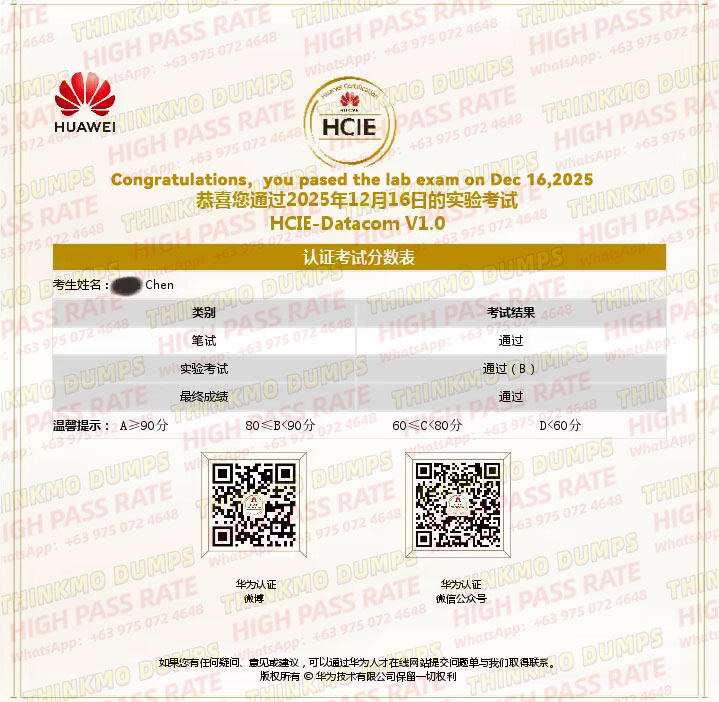 3
3 Success Streak: ThinkMo’s Dec HCIE-Datacom Win
上传:2025-12-24
-
 4
4 ThinkMo Guide: Cisco & Huawei Certification Com
上传:2025-12-22
-
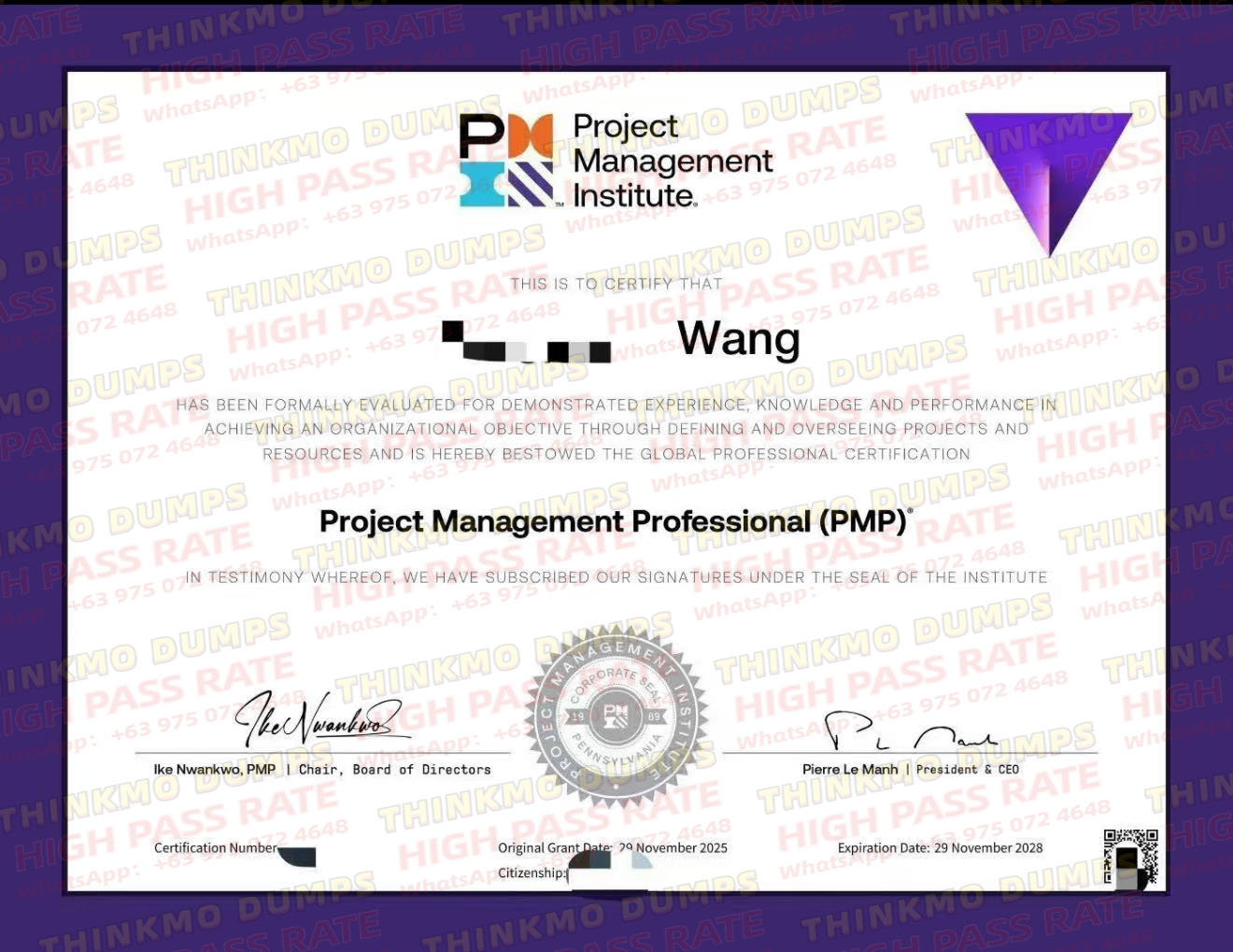 5
5 Pass CCIE/CKA Exams with ThinkMo’s Top Question B
上传:2025-12-19








